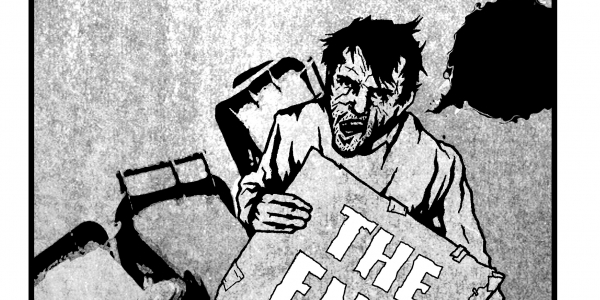For their most ardent fans, Radiohead’s sublime seventh album – In Rainbows – inhabits a strange position on the Oxford quintet’s evolutionary chain.
For their most ardent fans, Radiohead’s sublime seventh album – In Rainbows – inhabits a strange position on the Oxford quintet’s evolutionary chain. Unveiled in 2007, In Rainbows diverged significantly from the experimentation that devotees had become so enthralled by and distilled the foreboding intensity that had underpinned Radiohead’s emotional profundity since day one.
While the album still utilised synths and electronic components, In Rainbows was a return to melody-driven songwriting, and their most accessible album since The Bends (1995). In spite of this, loyal fans came to realise the transcendence of what was achieved through Radiohead’s seventh album – the eerie subtleties underlying In Rainbows‘ melodic richness not only reinforced ingenuity in the harmonious textures, but led to their emotional complexity through divergent channels.
With those thoughts in mind, Radiohead’s eighth album – The King Of Limbs – is a more daring and mind-bending aural experience than In Rainbows. While the second half of The King Of Limbs does recall the more spacious groove melodies of In Rainbows, the first half contains strong invocations of their electronic-driven experimental oeuvres, Kid A and Amnesiac (Radiohead’s fourth and fifth albums, respectively). The King Of Limbs incorporates elements of the obscure electronica, krautrock, free-form jazz, classical music and ambient noise utilised on the aforementioned albums, but encompasses Thom Yorke’s escalating fascination with dubstep/IDM/abstract hip hop (particularly Flying Lotus and Four Tet) more profusely than prior recordings.
Radiohead’s abhorrence of artistic limitations is often misconstrued as disregard for their alternative rock roots; they simply possess a stern refusal to submit to ideals other than those espoused through the philosophy of their art. At this point, Radiohead’s influences and musical ambitions have become so far-reaching that The King Of Limbs positions itself as a completely distinctive record in the band’s catalogue – a mind-bending rhythm and texture-driven album interspersed with ghostly melodic grooves.
The King Of Limbs opens with Bloom‘s rippling keys, skittering bleeps and splattering percussive rhythms before Yorke’s ghostly wail emerges. An instrumental section mid-song opens into ambient flourishes and a majestic wave of incandescent strings, whereby orchestral divinity meets undulating electronica.
Morning Mr Magpie continues the schizophrenic intensity of its predecessor while harnessing a funk assault. Jonny Greenwood’s looping guitar riff drives the eerie composition in which complex, alien textures coalesce in a chaotic but harmonising manner. The spiralling, hypnotising Middle Eastern melody of Little By Little (Ed O’Brien sounds busy on this track) converges into the frenetic and head-combusting Feral; pulsating amidst glitch-y blips and distorted vocal samples, the latter recalls The Gloaming‘s electronica while residing in its own exotic orbit. It’s a remarkably trippy opening – and as usual, album/song themes fluctuate between the painfully vivid and beautifully abstract.
The themes of man versus nature / technology versus natural are apparent and accentuated by the album title (the "King of Limbs" is a 1000-year-old oak tree in Wiltshire’s Savernake Forest) as well as the cover art, while serving as a compounding metaphor for humanity’s constant state of limbo. Like Kid A, The King Of Limbs almost resembles a concept album with its transition from birth/awakening of life (Bloom) to death/disconnection (Give Up The Ghost/Separator).
Yorke’s tenor vocals dance gracefully around the magical subtleties of the album’s most accessible track, Lotus Flower; Colin Greenwood’s ingenious bass playing and Phil Selway’s nimble beats render the song immediately transfixing.
Of course, the instinctual delight of those impenetrable grooves proves deceiving in light of its longing introspection. Like the most affecting of Radiohead’s songs, the piano-laden Codex is so piercingly melancholic that the listener feels suspended in the winds of a cliff’s edge. The lyrics may read, literally, like a signing-off-on-life note, but the overall sentiment is one of liberation or transcendence – a rare, almost unattainable pursuit, but one worth living for, nonetheless.
Give Up The Ghost ‘s eerie and ethereal poignancy invokes the throat-parching potency of You And Whose Army as Yorke’s vocals summon a devastating intimacy; only this time it’s harnessed to a choir of ghostly backing vocals. The hypnotic closer, Separator, elicits Yorke’s most seductive vocal hook ("It’s like I’m falling out of bed / From a long, weary dream") atop a devilish jazz-hop groove, before arriving at a confronting end-note in Yorke’s echoing plea of "When I ask you again / Wake me up".
The King Of Limbs is an inimitable record and an utterly astonishing one – it manoeuvres through a masterful landscape of confounding multi-layered ideas, finds beauty in chaos and derangement in harmony, and leaves us questioning and discovering its true essence. Radiohead derive fulfilment from stepping into the unknown and leaving behind scattered keys for anyone patient enough to follow. One minute, we’re being gripped by the throat and dragged through a deserted forest; the next, we’re passing through a trickling waterfall into iridescent light.
Music this frightening and compelling deserves to be absorbed with the ruthless fervour in which it was created. Radiohead are more than a groundbreaking and once-in-a-lifetime band, they’re perpetual outsiders, unlikely philosophers and artistic visionaries. Radiohead’s artistic trajectory may be one of the most progressive in modern music, but no band remains more adept and dignified in their articulation and expression of societal fragmentation and human ache than this exceptional Oxford ensemble. This is music that stretches the realm of artistic and emotional potency so far that its impact is unfathomable. For many, it represents what is to be inspired; for some, that equals an impenetrable refuge.
Best Track: Codex – devastatingly poignant, exquisitely poised and frighteningly beautiful.
If You Like These, You’ll Like This: Post-OK Computer Radiohead albums
In A Word: Mind-bending.
Label : waste.uk.com/Remote Control

